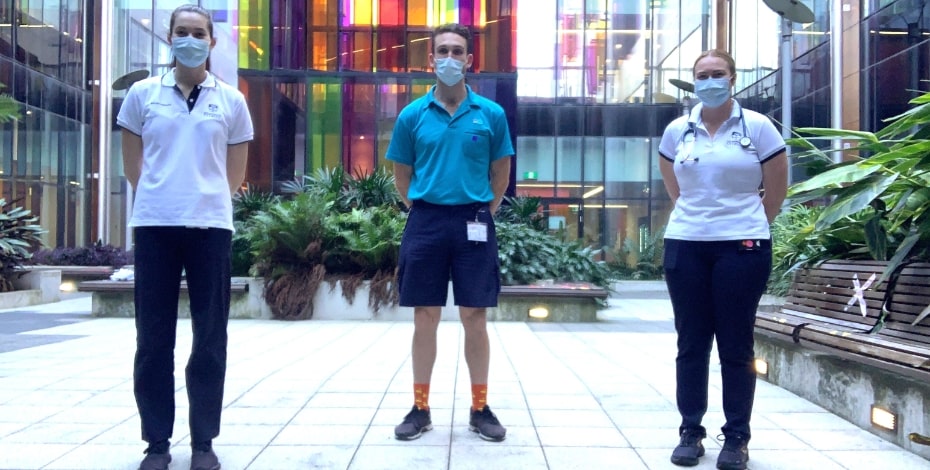
Not just a placement

Cameron Edwards knows what it is like to be one of the only Aboriginal students in a physiotherapy course. A discussion about his new role mentoring Aboriginal and Torres Strait Islander students through their placements.
Earlier this year, APA member and The Deadly Physios podcast host Cameron Edwards, a Kamilaroi man, heard that the Indigenous support officer who had helped him out through his training at the University of Sydney had left.
So when the opportunity came up to support Aboriginal and Torres Strait Islander students through their physiotherapy placements, he jumped at the opportunity to be a positive role model and a mentor to them.
‘As I went through university, the Indigenous support officer was quite pivotal in their support role in my journey.
'I wasn’t necessarily going to do physiotherapy and this person gave me the self-belief and confidence to not only apply but to complete the degree, because there were some shaky moments towards the end,’ says Cameron.
After a conversation with his manager at Blacktown Hospital in Sydney’s west, Cameron committed to taking Aboriginal and Torres Strait Islander students from the University of Sydney’s physiotherapy program, for one five-week placement in their final years of undergraduate and postgraduate studies.
‘I’m basically extending a hand to show them what an Aboriginal physio looks like in the workplace and also just to provide that relationship for them,’ he says.
Cameron says it was important to him to provide a culturally safe workspace for the students he mentored.
‘I think getting placement sites that are culturally safe and appropriate is fantastic and all students should get at least one of those.
'I have been on a placement before where I had a racist educator, as a student, and it was quite difficult.
'It was quite confronting and there is a power relationship that’s inherent in student–educator relationships,’ he says.
With this in mind, Cameron approaches his placement mentoring with care and respect for a shared cultural heritage.
‘We have little yarns in the morning and an afternoon coffee break where we can discuss any issues that they’re coming up with, supporting them in their patient interactions or cross-cultural communication.
'I think the most important thing is the tone of it at the beginning and that’s talking about who’s your mob, what’s family like for you, brothers and sisters, mum and dad, aunties and uncles and things like that.
'Paying respect and giving them the voice to be proud of where they come from and who they are at the beginning of the placement sets that precedent,’ he says.
Statistically, Aboriginal and Torres Strait Islander students are more likely to have an adult in their family who has a chronic health condition, or a mental health problem, or they might have a relative in jail or other family problems to deal with.
Cameron says it’s important to be mindful of the historic and current disadvantage in terms of health, literacy and community issues and the barriers that can make it difficult, if not impossible, for students to complete their studies.
‘I’ll definitely introduce them to our Aboriginal liaison officer and other people in the Aboriginal workforce here in health and basically offer them a bit more support.
'I don’t provide the same accesses or supports or just offer everything outright to every student.
'But if a student comes to me because I make our relationship comfortable, I will make those supports that are necessary,’ he says.
Third-year physiotherapy student Fabien Alegria was one of several Aboriginal students who did a placement with Cameron this year.
Fabien, a Wiradjuri man, says it was really good to be placed with an Aboriginal physiotherapist.
‘It made me feel a bit more welcome, a bit more relaxed around him, that sense of familiarity at the beginning.
'With most of my clinical educators, I take some time to gauge them, to feel more comfortable around them, while with him, it was easier to do so.
'I really appreciated it and found it very important that he was an Aboriginal man,’ Fabien says.
Fourth-year student and fellow Wiradjuri man Lance Cheney, who also did a placement at Blacktown with Cameron, agrees.
‘I feel like it was a safer environment.
'I felt more comfortable speaking to him.
'It was really informative and I feel like Cameron gave a lot to us, because he was inspiring, and he was trying to support us Indigenous students.
'It’s such a great thing to have, to know that you’re comfortable sharing with another Indigenous mentor,’ he says.
Just as important as the support, Fabien says, was that Cameron was an Aboriginal man working in a major hospital as a physiotherapist.
‘We need people like that to be with us because they show us the way and that’s how most of our communities run anyway, elder people passing down their knowledge and experiences.
'So it helps the younger generation flourish,’ Fabien says.
Cameron would love to see more Aboriginal and Torres Strait Islander physiotherapists put their hands up to support Aboriginal and Torres Strait Islander students as they go through their training.
‘It doesn’t have to be a big hoorah, just a small conversation with your uni about what’s being done in terms of support for students, because that’s the only way that we’re going to build our workforce numbers,’ he says.
Click here to check out the first series of The Deadly Physios podcast. And look out for series 2 dropping in March.
Main image: physiotherapist Cameron Edwards and two of the students he mentored this year.
© Copyright 2024 by Australian Physiotherapy Association. All rights reserved.





